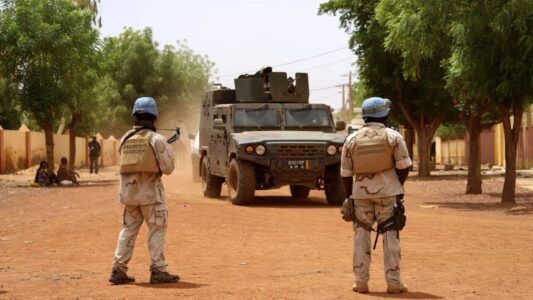
UN report elevates al-Qaeda terrorist group as top long-term global threat
The militant group al-Qaeda, aided by stable leadership and the Taliban’s takeover of Afghanistan, is growing in strength in regions around the world, according to a new report released by the United Nations, with several countries saying it is outpacing the Islamic State (IS) group to be the top global threat in the long-term.
In a UN Security Council report published on Tuesday, the international body looked into the activities of al-Qaeda, IS and other militant groups, concluding that the threat of al-Qaeda and IS remains high in conflict-hit regions and neighbouring countries.
While the two militant groups have largely receded from news headlines since IS lost vast amounts of territories it controlled in Iraq and Syria, the UN points to the continued presence of IS fighters in the two countries, estimating their total strength to be between 6,000 and 10,000 fighters.
IS currently poses an immediate risk, while several countries view al-Qaeda as the top long-term threat.
“Member States continue to judge that ISIL poses the more immediate threat in this regard, although some regard Al-Qaida as the more dangerous group in the longer term,” the UN report said.
“The international context is favourable to Al-Qaida, which intends to be recognized again as the leader of global jihad. Al-Qaida propaganda is now better developed to compete with ISIL as the key actor in inspiring the international threat environment, and it may ultimately become a greater source of directed threat.”
The UN’s assessment goes on to outline the two groups’ presence in Africa, Asia and Europe.
One of the key areas that show how al-Qaeda is outmanoeuvring IS is in Yemen, where its affiliate al-Qaeda in the Arabian Peninsula (AQAP) “remains the most important Al-Qaida affiliate for the dissemination of propaganda”.
Despite a number of setbacks for AQAP, it continues to pose a more significant threat than the IS branch in Yemen.
“Islamic State in Iraq and the Levant – Yemen (ISIL-Yemen) is considered to be overshadowed in Yemen by AQAP,” the UN report says.
However, at the same time, the report notes that al-Qaeda’s global leadership “has demoted Al-Qaida in the Arabian Peninsula below the African affiliates”, highlighting the growing importance of the African continent for the growth of the militant group.
The United Nations report found that the most dynamic and dangerous militant networks are in Africa, particularly in the horn of Africa and the western region of the continent in the Sahel.
“It is notable that two of the three most dynamic ISIL networks are in Africa, which is also the location of some of Al-Qaida’s most dangerous affiliates,” the report said, using another acronym for the IS group.
“Member States remain acutely concerned about the spread of terrorist violence in Africa.”
In Somalia, the tax revenues generated from the local militant group al-Shabaab help to fund al-Qaeda, according to one member country.
In Afghanistan, al-Qaeda enjoys a comfortable stay under the Taliban government, according to the report, and some of its senior cadres are allegedly providing advisory services to the de facto government there.
“Al Qaeda leadership reportedly plays an advisory role with the Taliban, and the groups remain close,” the report states.
It also states that the leader of the militant group, Ayman al-Zawahiri, is alive and living in the country, and his “comfort and ability to communicate” coincided with the Taliban’s takeover of the country last August.
Zawahiri took over the leadership of al-Qaeda in 2011 following the assassination of Osama Bin Laden on 2 May of the same year.
The report stated that the reason al-Qaeda is not an immediate international threat is that it lacks an external operational capability and does not currently wish to cause the Taliban international difficulty or embarrassment.
The Taliban have drifted in and out of power in Afghanistan since the early 1990s when mujahideen fighters trained by the US and Pakistan seized power following the defeat of the Soviet Union. The war also provided the ideological incubation for Osama bin Laden and al-Qaeda.
They were removed from power following the 2001 US-led invasion of Afghanistan but maintained a guerilla war against both occupation forces and the Afghan government until retaking the country in 2021 after the pullout of US troops.
The Taliban government’s sheltering of al-Qaeda was the original motivation for the US invasion of Afghanistan after the 11 September 2001 attacks.
Source: Middle East Eye





